Commentary: How Gustavo Dudamel is preparing 106 musicians from 22 countries for a monumental Bowl debut
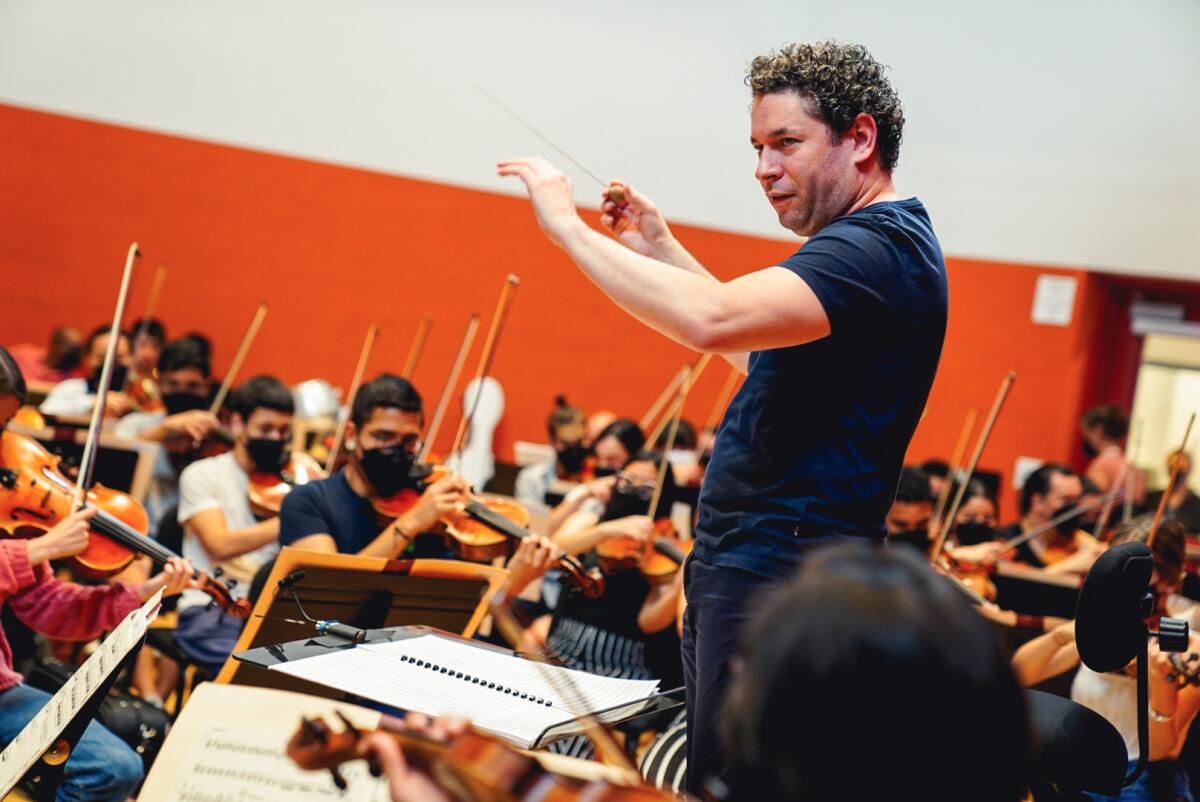
- Share via
On Saturday morning, Gustavo Dudamel stood before a large orchestra of young musicians, along with a handful of eminent mentors seated among them, ready to give the downbeat. “Be careful of the level of volume you give me,” he said with a sly smile, before launching into a rehearsal of a raucous new piece. The exuberant orchestra clearly knew he didn’t mean hold back, just make it glorious.
The rehearsal space in the Los Angeles Philharmonic’s new Judith and Thomas L. Beckmen YOLA Center in Inglewood was tightly packed with little room for spectators. I sat against a back wall, behind the trombones and close enough to be a member of the ensemble. The brass-heavy sound I heard would have been different from the blast that reached Dudamel’s ears. But Frank Gehry designed the YOLA Center with high ceilings to give the sound room to breathe, and a volcanic explosion of ecstasy erupted at ground level, rising majestically heavenward.
Dudamel did not tamp it down. While demonstrating an intense surgical concentration needed for focusing raw sonic force into propulsive energy, he had a look on his face of unqualified joy. The orchestra, created by the conductor and his wife, Spanish actress María Valverde, contains players ages 18 to 26 from 22 countries. It is called Encuentros. The jazzy new piece they were rehearsing, an L.A. Phil commission by Venezuelan composer Giancarlo Castro D’Addona, is titled “Encuentro Obertura Festiva.” It will open a concert by the Encuentros Orchestra at the Hollywood Bowl Tuesday night.
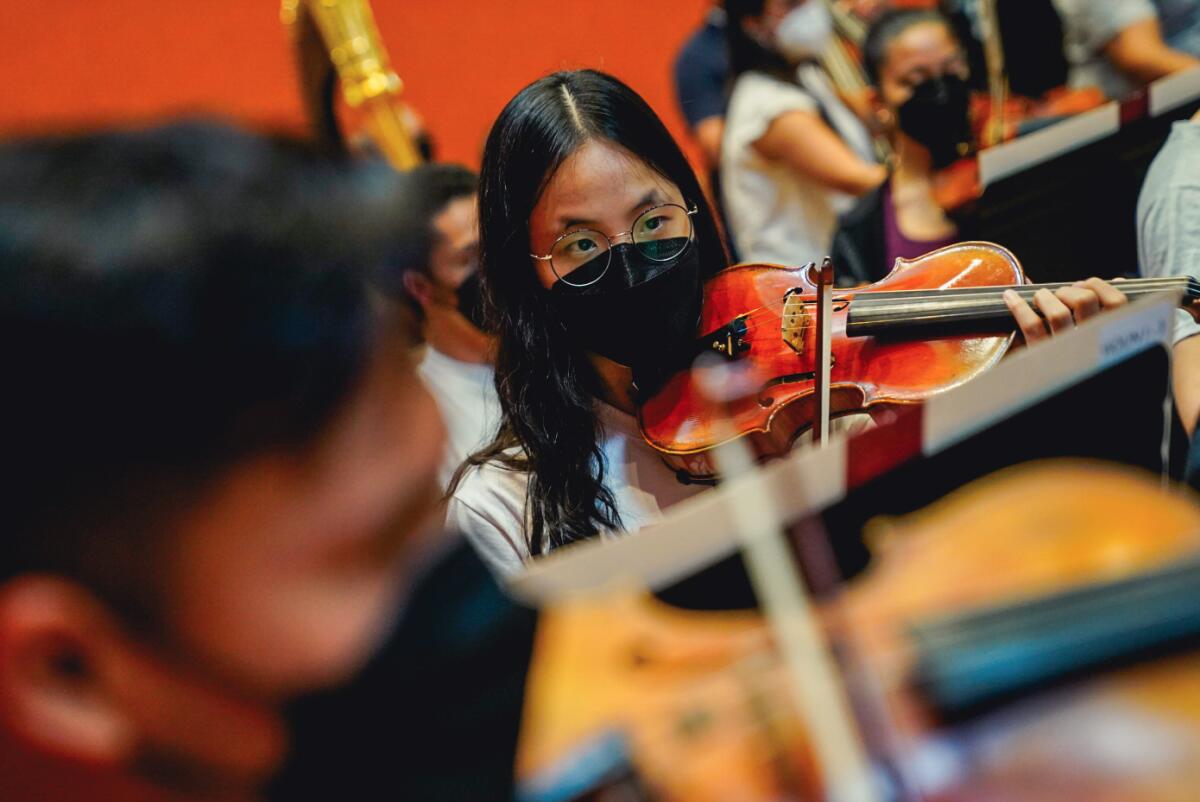
Encuentro is Spanish for encounter. This encounter, Dudamel told me two days earlier in an encounter with him and Valverde following an L.A. Phil rehearsal at the Bowl, had been a dream since creating his Dudamel Foundation a decade ago, when he was in his early 30s. The modest operation, which he and Valverde co-chair, has the immodest goal of pursuing the dream of his mentor, José Antonio Abreu, founder of Venezuela’s El Sistema extensive music education program, which was the model for the L.A. Phil’s YOLA (Youth Orchestra Los Angeles). The first Encuentros program was four years ago in Mexico City.
Thanks to Dudamel and to YOLA, similar programs now exist around the U.S., Europe, Latin America and Asia. Pretty much wherever Dudamel or Gehry (who has made the creation of YOLA-like centers a late-life mission) find themselves, they encourage the development of a music education program that can serve youth in the effort to provide further, and not only musical, opportunities.
For both Dudamel and Valverde, making music has to be something more than just making music. “They have to play in tune,” Dudamel explains. “They have to play the notes.” For that, the level of training is very high. The players work with 11 members of the L.A. Phil and famed members of other orchestras including Sarah Willis, the Berlin Philharmonic’s star French horn player, and Vienna Philharmonic concertmaster Rainer Honeck.
But encounters must go beyond that, Dudamel insists. “We sometimes forget that, you know, it’s another thing, the human connection.”
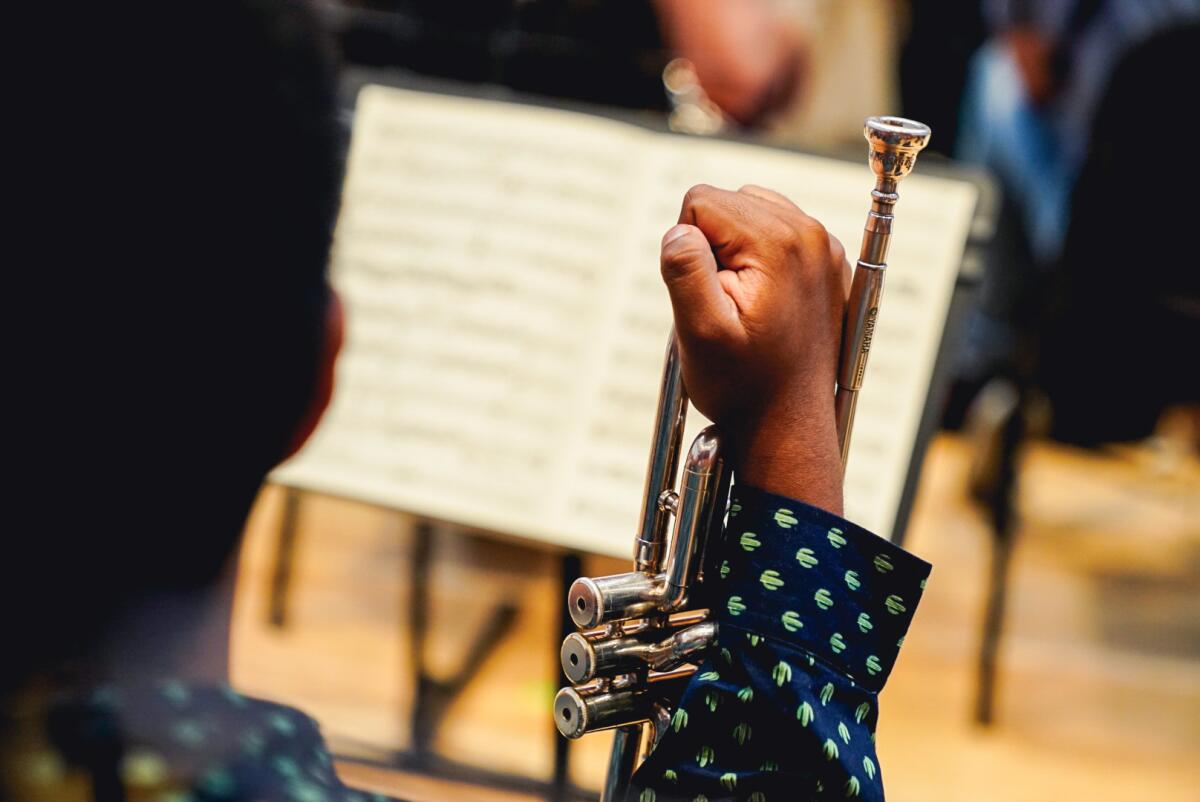
For Valverde, providing a sense of wellness is essential to making music together, and before the musicians played the first note, she arranged for a session with members from the Love Button Global Movement to create a family atmosphere. “They were coming from 22 different parts of the world. Some of them don’t speak English. Some don’t speak Spanish. One player from Japan doesn’t speak either English or Spanish,” she says, referring to the two languages in which the sessions are held.
“It’s not enough that they all speak the same language of music,” she continues. “We have to find ways for them to connect. And it is important that they don’t just know each other but also know themselves.”
Valverde believes that the connections must be broad, and that includes the land on which we live and work. Among the activities she organized for the musicians was a trip to Wishtoyo Chumash Village in Malibu to witness a ceremony by the Native American tribe that, along with the Gabrielino-Tongva peoples, was the first to inhabit the area around the Santa Monica Mountains.
The mission of the foundation, Dudamel adds, is to provide the process — through encounters musical and, like the Chumash ceremony, beyond — that can lead to personal empowerment.
“I tell them, look, when you are walking on the street,” he explains, “you are normal people like everybody else. But you cannot imagine the power you have in your hands when you take an instrument and you play. You can transform the feeling of that person. People cry. People laugh. You are magicians.”
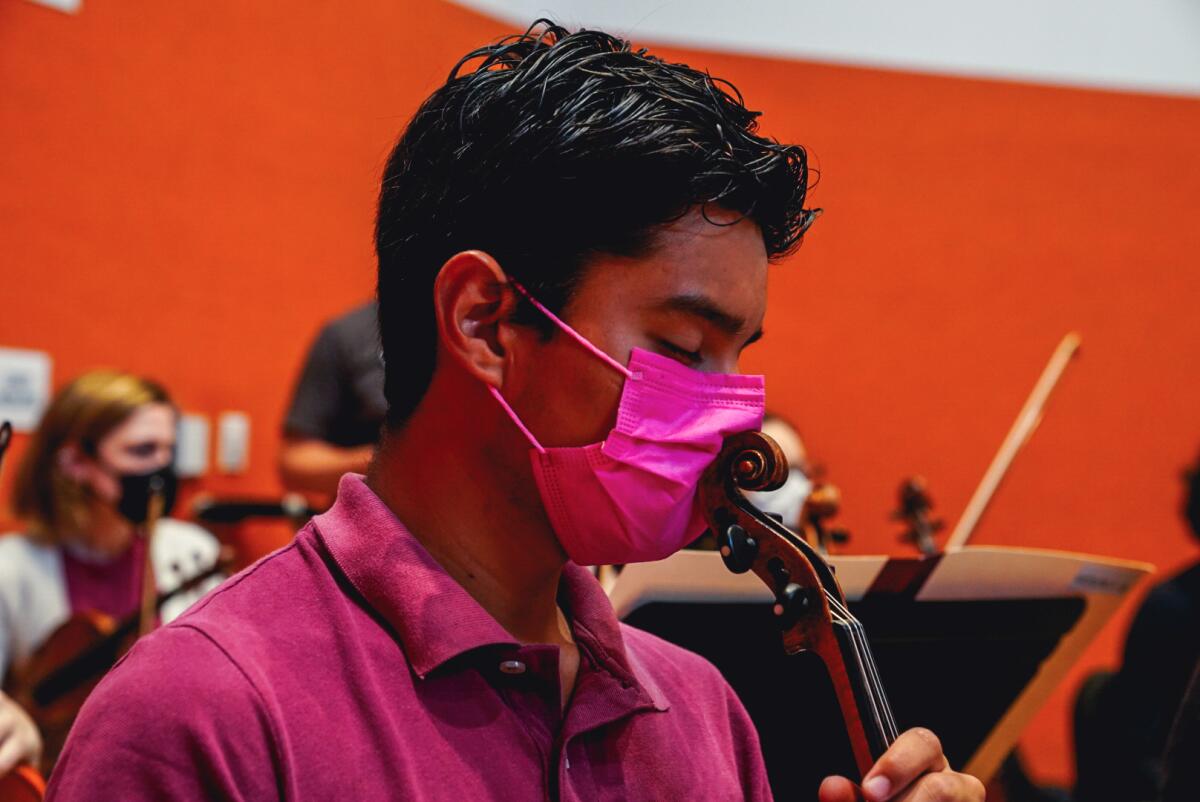
Even so, it takes a magician to make a magician. The orchestra has been together for 10 days before Saturday’s rehearsal, preparing for Tuesday’s concert. The more than 100 (106 to be exact) young musicians will cap Dudamel’s three-week celebration of 100 seasons at the Bowl with a major new piece, “Gaia,” which the L.A. Phil has commissioned from jazz saxophonist Wayne Shorter (bassist Esperanza Spalding is featured soloist) and Dvořák’s “New World” Symphony, along with the “Encuentro” overture.
The three-hour rehearsal, which involved the young musicians mostly working on “Gaia” without Spalding, was fairly tense. Shorter’s orchestral textures are delicate but when woven together produce a thick wash of sound. Dudamel wants everything to be transparent. The flow must feel improvisatory. Dudamel occasionally broke the mood with a little levity, but mainly he was persistent on getting it right. Sitting among the brass and near the percussion, that sense of empowerment in the players seemed not only credible but palpable. The camaraderie proved stirring.
How Dudamel fits this all in is a wonder. When I met with him Thursday, he had just finished rehearsing Carl Orff’s “Carmina Burana” for that evening’s program, which included yet another premiere, Gonzalo Grau’s “Odisea,” a concerto for the small Venezuelan guitar known as a cuatro and featuring an extraordinary soloist, Jorge Glem. That night, Dudamel conducted a magnificent “Carmina Burana” from memory, featuring the Los Angeles Master Chorale and Children’s Chorus, as well as ravishing solo singers Elena Villalón, Arnold Livingston Geis and Elliot Madore. That alone would be an admirable week’s work for many conductors.
But two nights earlier, on Tuesday, Dudamel had led a Beethoven program at the Bowl and appeared to fill in every extra moment during the week rehearsing and, with Valverde, hosting Encuentros. That included seven-hour days with the orchestra on Friday and Saturday, as well as a big dinner Friday night.
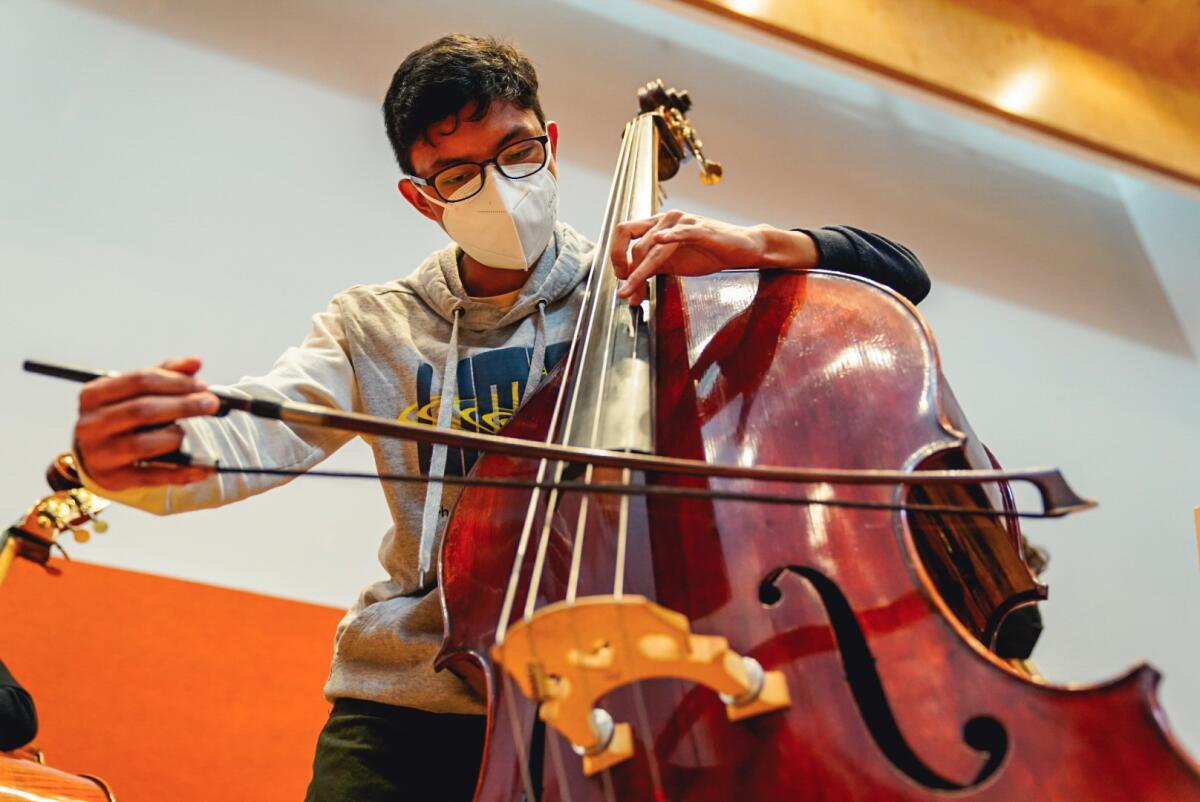
Lest he neglect YOLA, though, Dudamel also worked with a special YOLA National Orchestra, an annual gathering of top players from similar programs around the U.S., that took place last week at the same time as Encuentros, making the Beckmen YOLA Center a very busy place. Walking by an administrator’s office, I saw it taken over by a couple of oboists. Dudamel also arranged for the Encuentros players to help coach the younger YOLA musicians.
The YOLA orchestra, 170 strong from 19 states and one U.S. territory, performed Sunday night at Walt Disney Concert Hall. Dudamel conducted the last movement of Tchaikovsky’s Second Symphony and Rossini’s “William Tell” o,verture. The players ranged in age from 9 to 18. The strings swayed as they played, El Sistema style. Dudamel led with exacting gestures. His tempos were fast, and the performances crackled with electricity. Solo passages verged on the stellar. Many in the audience seemed on the verge of dancing and rightfully so.
When asked how he handles all this, which will also include taking the Encuentros program to the Greek Theatre at UC Berkeley Thursday night, Dudamel says that were he to look at his schedule, “I would know, objectively, it’s crazy. But what I see that it is giving to me in my life as an artist is incredible.”
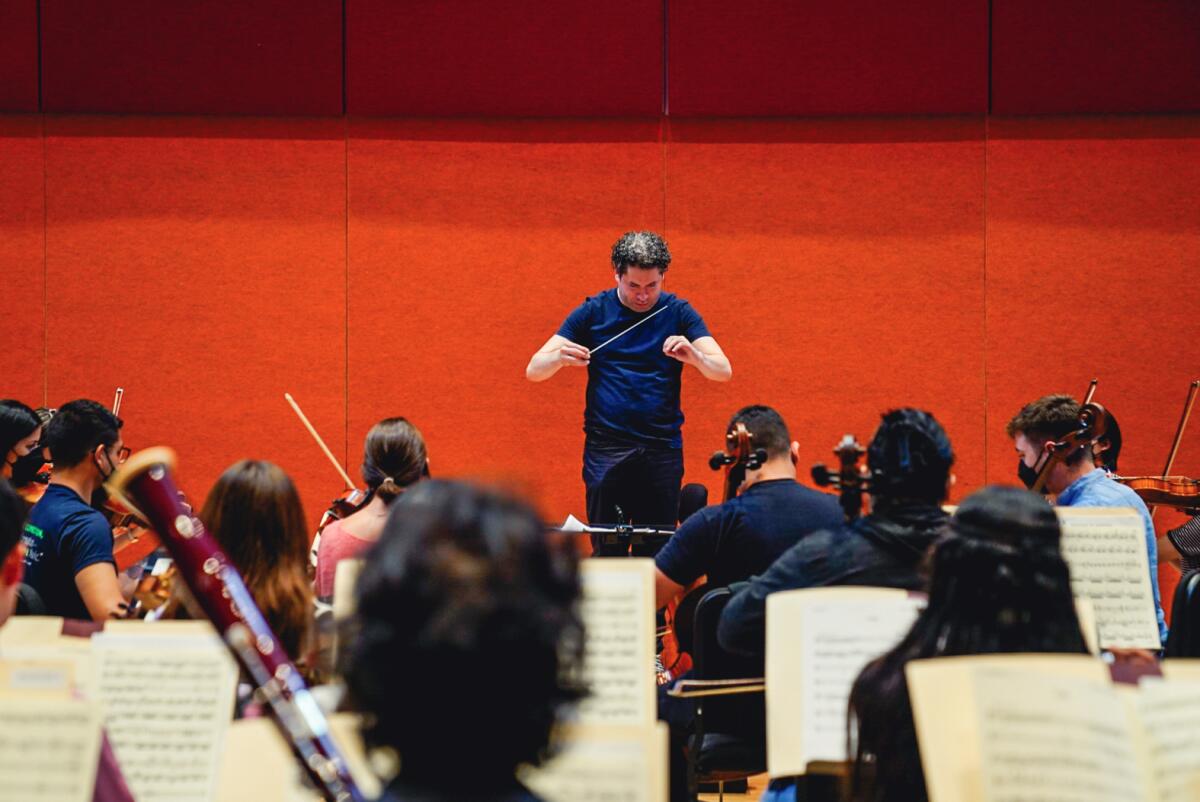
He also finds that when he stands in front of the young musicians, he thinks about how he was once one of them. “This was a dream and now this lets us to keep dreaming,” he says. “It’s empowering for me.”
“We’re overwhelmed,” Valverde finishes the thought.
'Encuentros Orchestra'
Where: Hollywood Bowl, 2301 N. Highland Ave.
When: 8 p.m. Tuesday
Tickets: $1-$130
Info: (323) 850-2000, hollywoodbowl.com
More to Read
The biggest entertainment stories
Get our big stories about Hollywood, film, television, music, arts, culture and more right in your inbox as soon as they publish.
You may occasionally receive promotional content from the Los Angeles Times.











